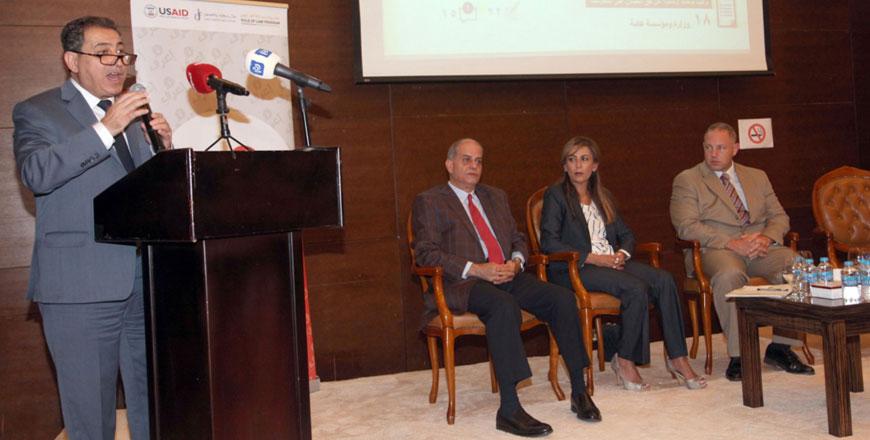You are here
Initiative aims to boost access to information in Jordan
By Laila Azzeh - Oct 10,2016 - Last updated at Oct 10,2016
AMMAN – Access to information is a right, not a luxury, which improves transparency, supports efficient public administration and helps combat corruption, experts agreed on Monday.
In Jordan, the Access to Information Law aims to facilitate the public’s access to official documents, granting access to almost all types of information except those classified as “secret”, as per legislation on protecting state documents and secrets.
While the law was drafted in 2007, it is “still inactive”.
“After about 10 years of going into effect, the law is still not applied the way it should be. It is a controversial law, but serious efforts should be exerted to enforce it,” said Centre for Defending Freedom of Journalists (CDFJ) President Nidal Mansour.
To this effect, the centre on Monday launched Iref (know) initiative to enhance transparency and boost the right to access information.
The CDFJ, in partnership with USAID’s rule of law project and with USAID funding, will work with ministries, public administrations and departments to develop the procedures necessary to facilitate access to information.
“The [CDFJ] has also been working with the King Abdullah II Centre for Excellence to include this right among the criteria for the King Abdullah II Award for Excellence in Government Performance and Transparency,” said Mansour during a ceremony to launch the initiative.
The three-year project seeks to help draw the best practices necessary to provide information to visitors of public departments, and to help institutionalise mechanisms of classifying documents.
The project also aims to develop the use of technology as a platform for the voluntary disclosure of information.
Following the endorsement of the law, the Information Council was created to serve as a specialised body to oversee the implementation of the law.
Several amendments were introduced to the law that shortened the period during which public agencies must respond to a request seeking information from 30 to 15 days.
“While the government said that circulars were sent to all public agencies and ministries to ensure they have the necessary forms for those seeking to use the law to acquire information, they remained shelved in most institutions and staff members are still unaware of the mechanisms of the law,” the CDFJ president said.
While stressing the importance of the law, Amman Mayor Aqel Biltaji underlined the need to verify the reasons behind accessing information.
Culture Minister Nabih Shuqum, who also serves as the Information Council commissioner, deemed Iref an “innovative” project, adding that the council has done a “great job” in responding to complaints related to access to information.
Speaking on behalf of Minister of State for Media Affairs and Communications Mohammad Momani, Faisal Shboul, the director general of the Jordan News Agency, Petra, voiced hope that the initiative would ensure better transparency amidst what he described as “the era of rumours” spread by social media websites.
“We hope that Iref would boost media ethics through facilitating access to information for media people,” he said.
Sean Osner, the director of the USAID’s Democracy, Rights and Governance Office, noted that Jordan realised early the importance of access to information as a key pillar of human rights and good governance.
“Jordan was the first Arab country to enact an access to information law,” he said, stressing the USAID’s commitment to supporting Iref as a pioneering scheme towards better transparency.
Related Articles
AMMAN — Minister of State for Media Affairs Jumana Ghunaimat on Wednesday reiterated the government’s commitment to ensure easy access of in
AMMAN — The Centre for Defending Freedom of Journalists (CDFJ) on Monday is scheduled to launch the Iref (know) project to enhance transpare
AMMAN — The Centre for Defending Freedom of Journalists’ (CDFJ) President Nidal Mansour stressed that Jordan is taking positive steps toward
















